Buddhist Teachings Which May Help with Clinical Depression, Focusing on the Four Noble Truths, Eightfold Path, Five Precepts
Buddha taught the truth of suffering — a truth not unfamiliar to those who suffer from depression. He also taught a simple, non-religious method to treat our suffering. Some of us, who might not be “clinically” depressed — or might have symptoms of depression due to Covid-19 or other stresses — might suffer from some of the symptoms, such as fatigue and insomnia. Buddha’s Four Noble Truths, Eightfold Path and teachings on Bodhichitta and Compassion offer hope and relief.
Editors note: this by Nicholas H. Parker explores the topic, buto does not offer advice. Always consult your health or mental health consultant for advice on treatment.
By Nicholas H. Parker
[Bio below.]

What is Depression?
The Diagnostic and Statistical Manual of Mental Disorders lists the following criteria for depression, of which five or more should occur for a minimum of two weeks:
- Depressed mood occurring throughout most of the day and almost every day for at least two weeks
- Markedly diminished interest or pleasure in all, or almost all, activities throughout most of the day and almost every day
- Significant weight loss when not dieting or weight gain, decrease or increase in appetite nearly every day
- Insomnia or hypersomnia nearly every day
- Psychomotor agitation or retardation nearly every day (e.g. restlessness, feeling down)
- Fatigue or loss of energy nearly every day
- Feelings of worthlessness or excessive or inappropriate guilt nearly every day
- Diminished ability to think or concentrate, or indecisiveness, nearly every day
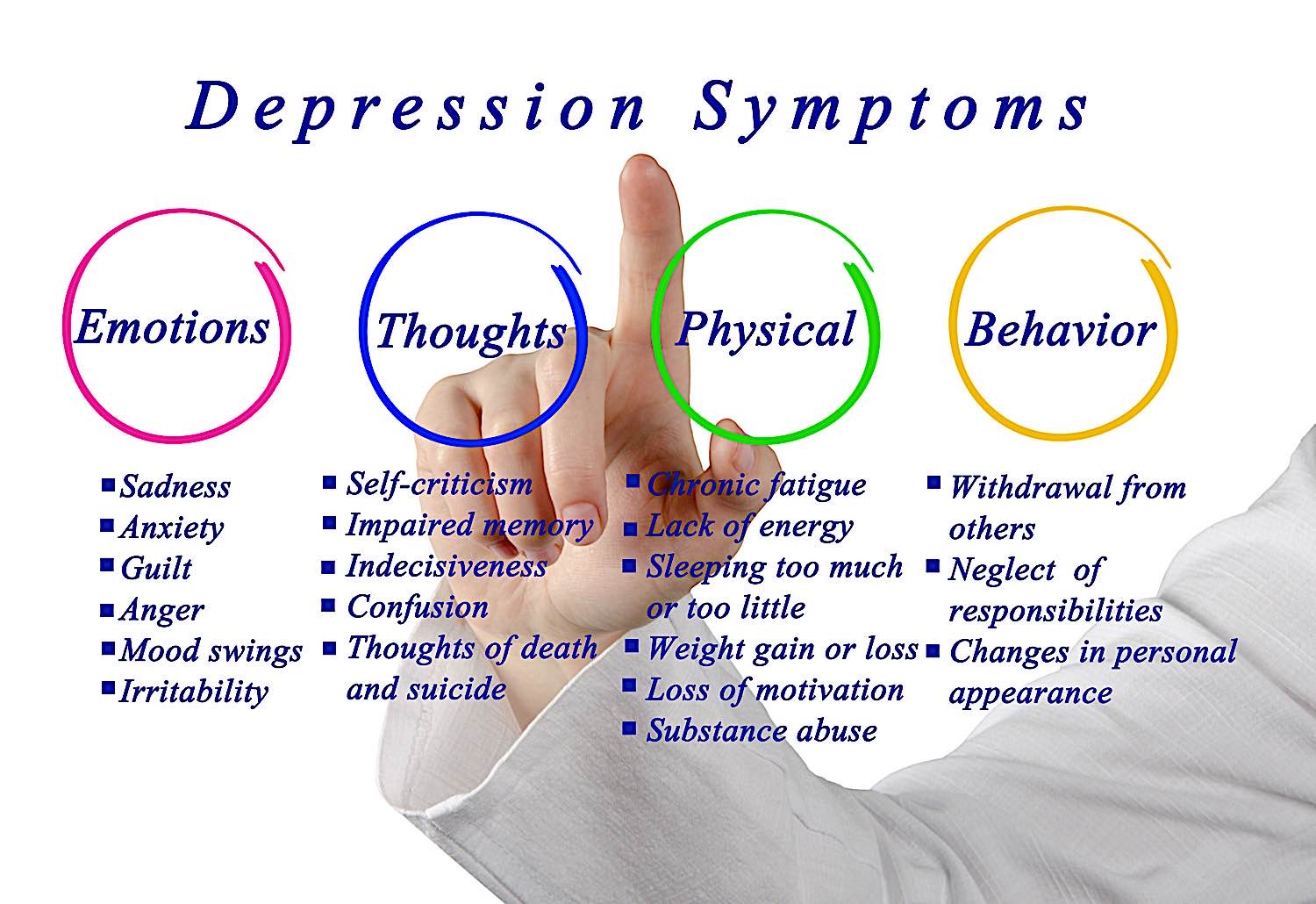
These diagnostic criteria do not fit all cases of depression, however, but are required for a diagnosis (by a medical professional) of Major Depressive Disorder.
NOTE: Always seek help from qualified medical or health practitioners for help with depression.
How Buddhist Philosophy Can Help Depressed People
Buddhism can be treated as a non-religion, which can make many religious individuals more comfortable about learning the philosophies presented by Shakyamuni Buddha over 2500 years ago. Consider the Teachings as “guidelines” that can help one attain a greater sense of self-happiness and an improved sense of control over one’s happiness.

Buddhist Teachings contain three core, universal teachings which are Buddha’s advice for overcoming suffering:
- The Four Noble Truths
- The Eightfold Path
- The Five Precepts
Unlike other religious philosophies where “rules” are presented with strict punishments or threats of rejection, Buddhist philosophy provides positive reinforcing guidelines for a peaceful and happier life for the individual with only the truth of Karma to consider.

Buddhism also teaches meditation methods — which research affirms is helpful in depression including for children [cited studies here>>] — and also methods such as metta and karuna — loving-kindness and compassion, which can be important supports for people suffering from depression — or any form of suffering. Other important teachings that can be reinforcing for people with depression include the Four Immeasurables. [For a feature on the Four Immeasurables, see>>]
- Feature covering research on Buddhist Compassion meditation and its positive benefits to people suffering from depression>>
- Feature covering Metta (loving kindness) meditation and its mental health benefits, based on peer-reviewed research>>
- 10 Benefits of meditation based on peer-reviewed research>>

Karma: Good or Bad?
Many who do not understand Buddhism use the word “karma” but do not understand the meaning. Karma is considered the law of the universe in the sense that “you reap what you sow.” Karma, however, is reinforcing and positive — because you are in control, quite different from notions of fate and “it is out of my control.” [For a feature on the positive aspects of karma, see>>]
Karma for the Buddhist or person who lives by Buddhist philosophy can be considered as: “If I live following the “Eightfold Path,” and other teachings I learn from Buddhism, I will be sowing seeds that reap happiness for myself. If I do not follow these teachings, I am equally responsible for not sowing seeds of happiness which can result in great unhappiness or suffering.”
This is an essential concept to understand because it places the responsibility for one’s happiness in one’s own hands. It can be important for people with Depression to understand that they have more control over their situation than they initially believe.
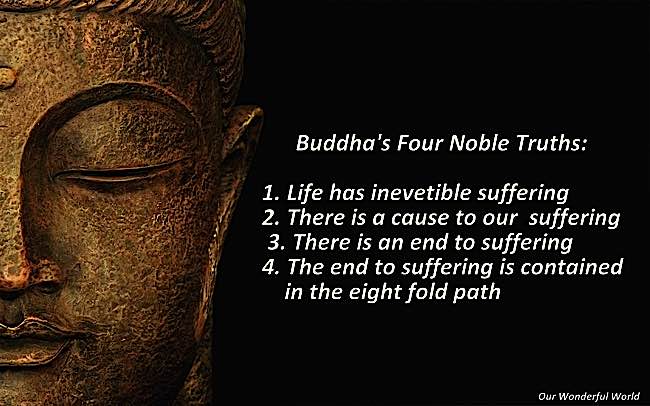
The Four Noble Truths
The Buddha’s first teaching, the Four Noble Truths, explained suffering and its cause and cure — truths that are true for all human beings:
- Life contains suffering
- There is a cause to this suffering
- There is also a cure to the suffering
- The cure to suffering is the “Eightfold Path”

The suffering that the Buddha spoke of was desire and attachments, or more specifically the desire for things one does not or cannot have. The Eightfold Path is a series of eight behavioral and cognitive changes one can make in oneself to free oneself from suffering.
When considering the symptoms of Depression, especially the lack of happiness and pleasure in life and the sense of the individual having no control over their lives, their feelings, their thoughts, or themselves, this teaching can become a valuable tool for any psychologist dealing with this disorder, and possibly other disorders.
Many people with depression find it difficult to pinpoint the causes of their depressed feelings, and some feel that no matter what they do or try things will not get better. These are both thought patterns that can be successfully retrained through the use of Buddhist philosophy.
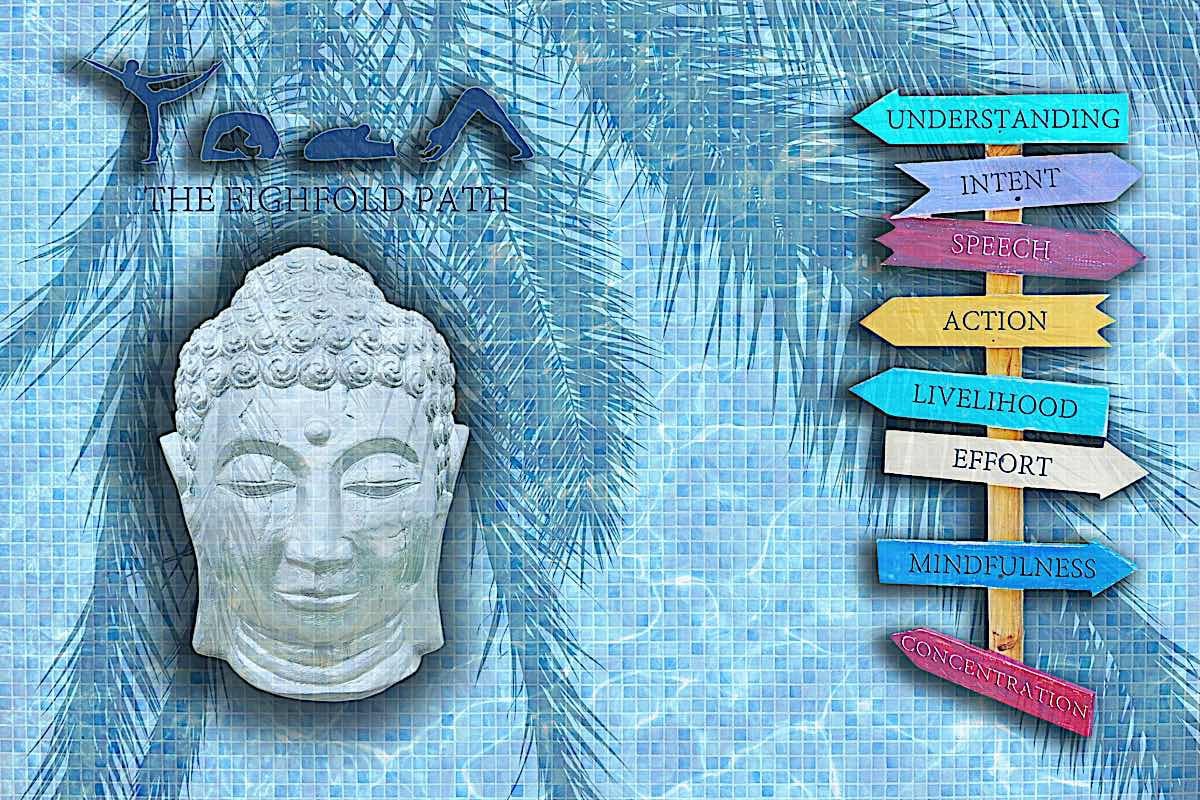
The “Eightfold Path”
The “Eightfold Path” consists of guidelines, a significantly softer word than “commandments,” that if followed lead the individual in a structured, forward-facing motion toward progress, control, and self-responsibility. “The Eightfold Path — which are positive reinforcements, the “Eight Rights” — consists of the following:
- Right Understanding: we should try to learn and understand these teachings
- Right Purpose: we should always try to do what is right
- Right Speech: we should try to always be truthful and kind in the things we say
- Right Conduct: we should behave ourselves
- Right Livelihood: we should earn our living in a way that does not harm others
- Right Endeavor: we should constantly try to become better
- Right Thought: we should cherish our thoughts because our words and actions arise from our thoughts
- Right Meditation: we should remember these teachings daily and strive to apply them to everything we do, think, and feel
These are guidelines. They are not laws putting strict regulations or demands on individuals, and they do not threaten punishments or rejections for failure to comply with one or all, but rather they encourage the individual to try to follow these guidelines as a means of living a better, happier, more fulfilled life.
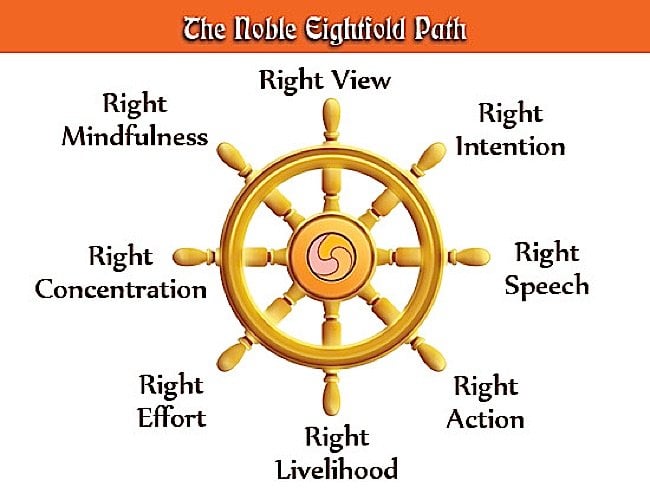
The “Five Precepts”
The “Five Precepts” are closely related to the” Eightfold Path.” “The Eightfold Path” explains what must be done to attain happiness for and within oneself, while the “Five Precepts” are more like traditional rules. By violating the “Five Precepts,” it is impossible to truly be living according to the “Eightfold Path.” “The Five Precepts” are guidance that help us abstain from yielding to our attachments and cravings:
- Abstain from taking life unnecessarily: this is not about becoming a vegetarian; it is about living a compassionate life.
- Abstain from taking things not given.
- Abstain from immoral actions.
- Abstain from the false speech.
- Abstain from intoxication, since a loss of inhibitions allows us to yield to our attachments and cravings.
These seem relatively simple to avoid, which can be a great confidence boost for the Depression sufferer. Gaining a sense of control over one’s happiness and feelings can be empowering and therapeutic, but professional advice should always be sought if problems are particularly distressing or disrupt proper functioning.
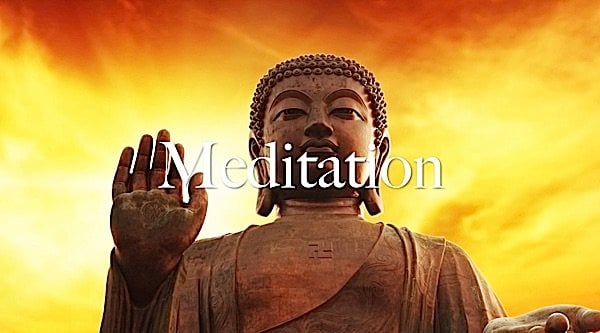
Meditation
Buddha also taught many methods of active meditation, which peer-reviewed studies indicate are helpful for people suffering from depression.
- Feature covering research on Buddhist Compassion meditation and its positive benefits to people suffering from depression>>
- Feature covering Metta (loving kindness) meditation and its mental health benefits, based on peer-reviewed research>>
- 10 Benefits of meditation based on peer-reviewed research>>
- Our special feature section on meditation>>
1 thought on “Buddhist Teachings Which May Help with Clinical Depression, Focusing on the Four Noble Truths, Eightfold Path, Five Precepts”
Leave a Comment
More articles by this author
Search
Latest Features
Please support the "Spread the Dharma" mission as one of our heroic Dharma Supporting Members, or with a one-time donation.
Please Help Support the “Spread the Dharma” Mission!

Be a part of the noble mission as a supporting member or a patron, or a volunteer contributor of content.
The power of Dharma to help sentient beings, in part, lies in ensuring access to Buddha’s precious Dharma — the mission of Buddha Weekly. We can’t do it without you!
A non-profit association since 2007, Buddha Weekly published many feature articles, videos, and, podcasts. Please consider supporting the mission to preserve and “Spread the Dharma." Your support as either a patron or a supporting member helps defray the high costs of producing quality Dharma content. Thank you! Learn more here, or become one of our super karma heroes on Patreon.
Nicholas Parker
Author | Buddha Weekly
Nicholas H. Parker is a content editor at the essay writer service BuyEssayClub. He used to manage the content team at the company he worked for. Currently, Nicholas writes articles to share his knowledge with others and obtain new skills. Besides, he is highly interested in the web design sphere.




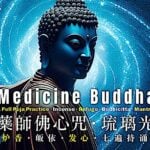





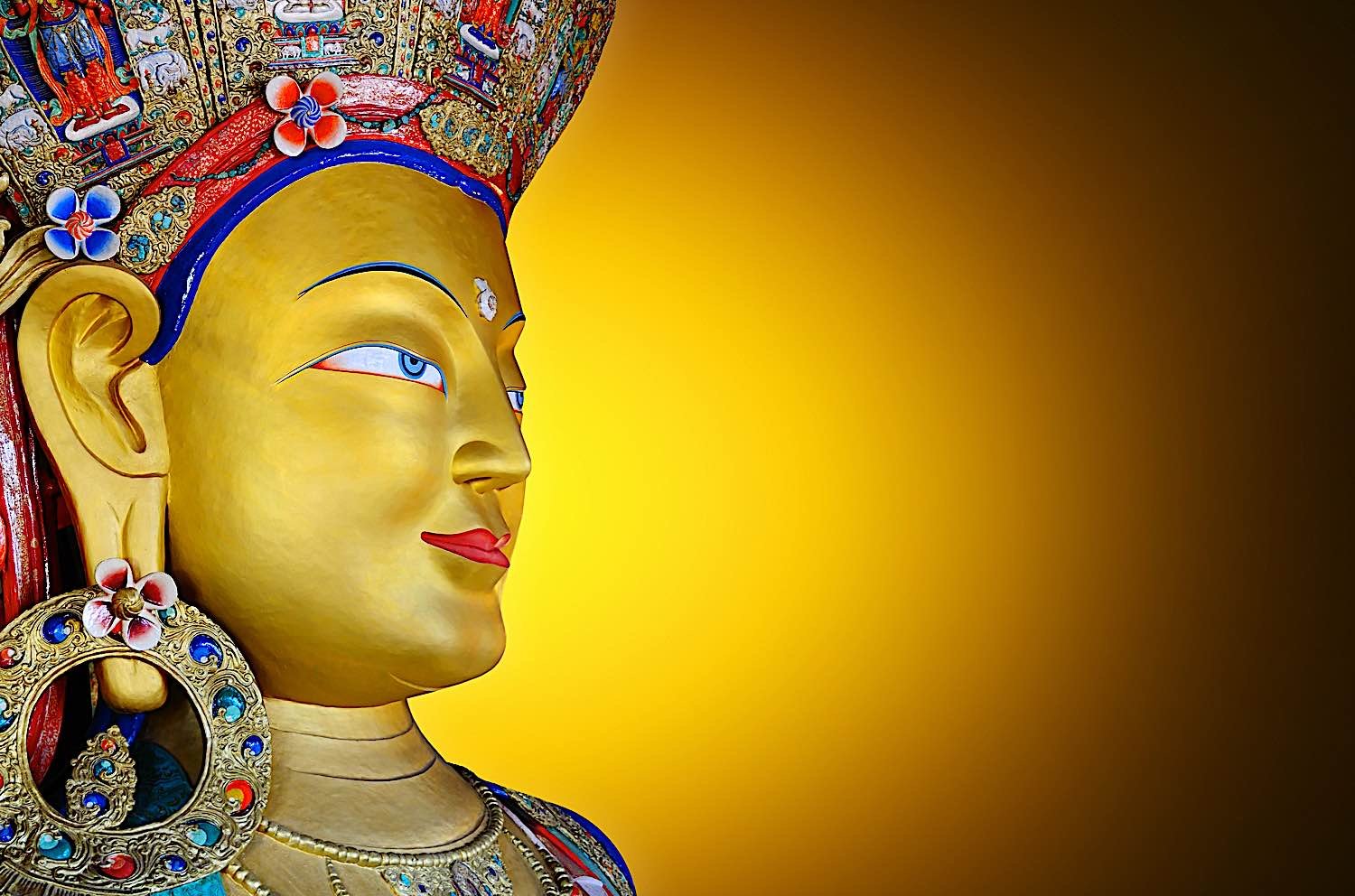



There is a cure for suffering????
Life contains suffering, of course! How do you respond to it? Go and sulk in bed with tears?
Eliminate desires? To me, that’s a “catch 22”! A desire to eliminate desires is still, a desire! Does this desire better your life or someone else?
———-
Changing Poison into Medicine
https://www.sokaglobal.org/resources/study-materials/buddhist-concepts/changing-poison-into-medicine.html
We all want to be happy. Whether we are conscious of it or not, almost everything we do is motivated by that desire. Yet, despite our best efforts and intentions, our actions and the ways in which we respond to situations can end up having the opposite effect.
This is easiest to observe in extreme circumstances—a conflict or misunderstanding, a destructive romantic entanglement or a gambling addiction. But the same dynamics play out over the course of a lifetime, often in less dramatic fashion, shaping the character and quality of our lives.
We respond in habitual ways to the events in our lives, often trying to avoid what is challenging or uncomfortable. And when difficulties arise, we may suffer from a sense of hopelessness or fear.
Perceiving the Reality of Our Lives
From a Buddhist perspective, it is the negative tendencies within our lives, such as egotism, greed and cowardice, which are the root of the problem. These distort our ability to clearly perceive our reality, causing us to respond to our environment and circumstances in ways that compromise our own happiness and lead us to become entrenched in negative patterns of behavior. Ultimately, all such tendencies can be traced to a lack of belief in the dignity and potential of our lives and the lives of all others.
When we are rooted in a sense of the expansiveness of our lives, we can face our circumstances squarely with confidence and an embracing spirit. This unleashes innate qualities of courage, wisdom and compassion, enabling us to steer the situation toward a more positive outcome. Wisdom enables us to choose the kinds of responses and courses of action that will lead to positive change, while courage gives us the ability to confront situations and persevere until we create a breakthrough. Compassion expands and deepens our motivation by making us aware of the suffering of others, including those involved with us in a challenging situation.
A Negative Cycle
The negative cycle in which we exacerbate or perpetuate our suffering is defined in Buddhism as the “three paths of earthly desires, karma and suffering.” They are known as “paths” because one leads to the other. “Earthly desires” here indicates not simply cravings but all desires, impulses and delusions that arise in the absence of wisdom and thus lead to suffering. The desire to escape suffering drives our actions. But when that action is based on delusions about the true nature of life and reality, we may make unwise choices and further compound our problems. This is the negative cycle of deluded impulses, negative karma (action) and suffering.
Some schools of Buddhism guide practitioners to eliminate desires as the means to break this cycle. Nichiren recognized, however, that the effort to eliminate desires is ultimately a fruitless pursuit, as some desires, in fact, create value and sustain life.
In his writings, Nichiren describes how faith in the Lotus Sutra transforms the three paths of earthly desires, karma and suffering into the three virtues of the Buddha—the Dharma body (truth), wisdom and emancipation (freedom).
The Medicine of the Lotus Sutra
Nichiren perceived that among the Buddhist sutras, it is the Lotus Sutra that teaches that Buddha nature is inherent in the life of absolutely everyone, including those normally thought incapable of attaining Buddhahood. To this end, Nichiren quotes an influential third-century Buddhist text that states that “[the Lotus Sutra] is like a great physician who can change poison into medicine.” The Lotus Sutra teaches, in other words, that each of us already possesses the wisdom, courage and other qualities of the Buddha.
Changing poison into medicine begins when we face difficulties with the confidence that we have within us the full resources to overcome them.
In the context of our daily lives, the process of changing poison into medicine begins when we face difficulties with the confidence that we have within us the full resources to overcome them. Problems are problems precisely because we doubt our ability to surmount them, but when we confront challenging circumstances with faith in the unlimited potential of our innate Buddha nature, we change our life state and transform our deluded responses. This is what Nichiren refers to as the “Dharma body” in the positive cycle described above. From this confidence arises the wisdom to clearly perceive our circumstances and the courage to face and fight on in the midst of difficulties. In this way, we are able to concretely transform our circumstances and experience a growing sense of freedom (emancipation). Such experiences, in turn, reinforce our faith in our inherent Buddha nature.
As Daisaku Ikeda states, to change poison into medicine is “to transform even the greatest evil into the greatest good.” One does not simply return to zero as it were, but one actually gains from the experience that once seemed so poisonous. In the words of Nichiren, “Poison turns into sweet dew [amrita], the finest of all flavors.”
The Buddhist practice taught by Nichiren, centered on chanting Nam-myoho-renge-kyo, is, in one sense, the practice of affirming faith in our inherent Buddhahood. This faith makes it possible for us to turn difficult experiences into opportunities to deepen our self-understanding, to strengthen and develop our courage and compassion, to grow in vitality and wisdom and ultimately to realize a limitlessly expansive state of life.